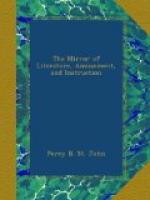return to England he brought over with him some of
the seed, and strongly recommended the practice which
he had witnessed to the adoption of his own tenants,
who occupied a soil similar to that of Hanover.
The experiment succeeded; the cultivation of field
turnips gradually spread over the whole county of
Norfolk; and in the course of time it has made its
way into every other district of England. The
reputation of the county as an agricultural district
dates from the vast improvements of heaths, wastes,
sheepwalks, and warrens, by enclosure and manuring—the
fruit of the zealous exertions of Lord Townshend and
a few neighbouring land-owners—which were,
ere long, happily imitated by others. Since these
improvements were effected, rents have risen in that
county from one or two shillings to fifteen or twenty
shillings per acre; a country of sheep-walks and rabbit-warrens
has been rendered highly productive; and by dint of
management, what was thus gained has been preserved
and improved even to the present moment. Some
of the finest corn-crops in the world are now grown
upon lands which, before the introduction of the turnip
husbandry, produced a very scanty supply of grass for
a few lean and half-starved rabbits. Mr. Colquhoun,
in his “Statistical Researches,” estimated
the value of the turnip crop annually grown in this
country at fourteen millions; but when we further recollect
that it enables the agriculturist to reclaim and cultivate
land which, without its aid, would remain in a hopeless
state of natural barrenness; that it leaves the land
so clean and in such fine condition, as almost to insure
a good crop of barley and a kind plant of clover, and
that this clover is found a most excellent preparative
for wheat, it will appear that the subsequent advantages
derived from a crop of turnips must infinitely exceed
its estimated value as fodder for cattle. If we
were, therefore, asked to point out the individual
who, in modern times, has proved the greatest benefactor
to the community, we should not hesitate to fix upon
the ingenious nobleman, whom the wits and courtiers
of his own day were pleased to laugh at as “Turnip
Townshend.” In something less than one
hundred years, the agricultural practice which he introduced
from Hanover has spread itself throughout this country,
and now yields an annual return which, probably, exceeds
the interest of our national debt.—
Sir
Walter Scott—in the Quarterly Review.
Coals in the East.
The Dutch newspapers state, that extensive coal mines
have been discovered in Sumatra and Bantam.
Naphtha
Has been found to burn much better than other oils
in mines where bad air prevails, and is less injurious
to the health of the workmen. Oil of colza and
tallow are extinguished, where naphtha, petroleum,
and oil of bone, continue burning.
Fossils.
Plates of above 600 fossil bones, (remains of a former
world) recently discovered in the neighbourhood of
Issoire, in France, are preparing for publication.
They belong to more than 50 species of animals, now
extinct; among which are elephants, horses, tapirs,
rhinoceri, eleven or twelve kinds of stags, large
cats, oxen, bears, dogs, otters, &c.




